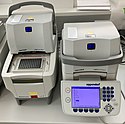Amplikon
Amplikon – fragment DNA powstały w naturalnym procesie duplikacji genów[1] lub podczas sztucznej amplifikacji w reakcji PCR[2] lub LCR[3].
Przypisy
- ↑ K Grondin, G Roy, M Ouellette, Formation of extrachromosomal circular amplicons with direct or inverted duplications in drug-resistant Leishmania tarentolae, „Molecular and Cellular Biology”, 16 (7), 1996, s. 3587–3595, DOI: 10.1128/MCB.16.7.3587, ISSN 0270-7306, PMID: 8668175, PMCID: PMC231354 [dostęp 2022-01-17] (ang.).
- ↑ Dingran Chang i inni, Detection of DNA Amplicons of Polymerase Chain Reaction Using Litmus Test, „Scientific Reports”, 7 (1), 2017, s. 3110, DOI: 10.1038/s41598-017-03009-z, ISSN 2045-2322, PMID: 28596600, PMCID: PMC5465217 [dostęp 2022-01-17] (ang.).
- ↑ Charlotte A. Gaydos, Thomas C. Quinn, Ligase Chain Reaction for Detecting Sexually Transmitted Diseases, Steven Specter, Mauro Bendinelli, Herman Friedman (red.), Boston: Kluwer Academic Publishers, 2002, s. 83–93, DOI: 10.1007/0-306-46807-7_6, ISBN 978-0-306-45848-4 [dostęp 2022-01-17] (ang.).
Media użyte na tej stronie
Eppendorf Mastercycler Pro S.jpg
Autor: GFJ, Licencja: CC BY-SA 4.0
Eppendorf Mastercycler Pro S, a thermal cycler for PCR and other applications
Autor: GFJ, Licencja: CC BY-SA 4.0
Eppendorf Mastercycler Pro S, a thermal cycler for PCR and other applications

